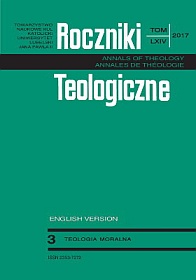Never–Ending Story of the Use of Vaccines Derived from Aborted Infants. Part I: Critique of Teleological Proportionalism and Consequentialism from the Perspective of Moral Theology
Abstract
The standard obligatory use of unethical vaccines derived from aborted human foetuses is currently a significant moral theological problem. It forms a serious dilemma of conscience especially when people become aware of the connection between their own actions and the morally wrong act committed by another person. However, a few years after the release of the declaration of Pontifical Academy for Life Moral Reflections on Vaccines Prepared from Cells Derived from Aborted Human Foetuses (5th May 2005), this serious problem was pushed into oblivion. Moral assessment is still dominated by consequentionalism and proportionalism which reject papal Magisterium ordinarium.
References
Balák, René. “Mandatory vaccination and conscientious objection”. Forum Teologiczne 15 (2014): 67–82.
Balák, René. Mysterium vitae—Život človeka v rukách človeka. II. Kraków: TSP, 2014.
Beiswanger, Christine. A Brief History of IMR–90. Cell Collections 2003/2004: 5–6, (http://ccr.coriell.org/ccr/newsletter/CCRNews.pdf_4.pdf.).
Buttiglione, Rocco. “Jak czytać encyklikę?” In Wokól encykliki “Veritatis splendor”. Ed. Jarosław Merecki, 12–13. Częstochowa, 1994.
Collins, Timothy. “The Vaccination Question.” The Angelus. Journal of Catholic Roman Tradition (February, 2006): 3–13.
Deisher, Theresa et al. “Impact of environmental factors on the prevalence of autistic disorder after 1979.” Journal of Public Health and Epidemiology 6 (2014), 9: 271–284.
Furton, Edward J. “Vaccines and the Right of Conscience.” The National Catholic Bioethics Quarterly 4.1 (Spring 2004): 53–62.
Geier, David A., Geier, Mark R. “Pediatric MMR Vaccination Safety.” International Pediatrics 18 (2003), 2: 203–208.
Geier, David A., Geier, Mark R. “A comparative evaluation of the effects of MMR immunization and mercury doses from thimerosal–containing childhood vaccines on the population prevalence of autism.” Med Sci Monit 10 (2004): 133–139.
Grabenstein, John D. “Moral Considerations with Certain Viral Vaccines.” Christianity & Pharmacy 2 (1999), 2: 3–6.
Hayflick, Leonard et al. “Preparation of Poliovirus Vaccines in a Human Fetal Diploid Cell Strain.” American Journal of Hygiene 75 (1962) (March): 240–258.
Hayflick, Leonard. Mortality and Immortality at the Cellular Level. A review. (August). San Francisco: University of California, 1997.
Hayflick, Leonard. “The Limited in Vitro Lifetime of Human Diploid Cell Strains.” Experimental Cell Research 37 (1965): 611–636.
Hayflick, Leonard, Moorhead, Paul S. “The Serial Cultivation of Human Diploid Cell Strains.” Experimental Cell Research 25 (1961) (December): 585–621.
Hayflick, Leonard, Plotkin, Stanley, Stevenson, Roger E. “History of the Acceptance of Human Diploid Cell Strains as Substrates for Human Virus Vaccine Manufacture.” Development in Biological Standardization 68 (1987): 9–17.
Hayflick, Leonard. “History of Cell Substrates Used for Human Biologicals.” Developments in Biological Standardization 70 (1989): 11–26.
Hooker, Brian S. “Measles–mumps–rubella vaccination timing and autism among young African American boys: a reanalysis of CDC data.” Translational Neurodegeneration (2014), 3: 16.
Hrehová, Helena, “Nové racionálne pochopenia života—bioetika a metafyzika.” Folia universitatis tyrnaviensis 15 (2008): 38–42.
Jacobs, Jeffrey P. et al. “Characteristics of a Human Diploid Cell Designated MRC–5.” Nature 227 (1970): 168–170.
Jacobs, Jeffrey P., Garrett, A.J., Merton, Rosemary. “Characteristics of a serially propagated human diploid cell designated MRC–9.” Journal of Biological Standardization 7 (1979), 2: 113–122.
Kern, Janet K. et al. “Evidence of neurodegeneration in autism spectrum disorder.” Translational Neurodegeneration 2 (2013): 17.
Kieniewicz, Piotr H. “Gdy nie ma innego wyjścia... Wobec stosowania szczepionek opracowanych przy wykorzystaniu linii komórkowych uzyskanych z abortowanych płodów ludzkich.” Roczniki Teologiczne 53 (2006), 3: 141–151.
Leiva, René. “A Brief History of Human Diploid Cell Strains.” The National Catholic Bioethics Quarterly (Autumn, 2006): 443–451.
Luńo, Angel Rodriguez. “Riflessioni etiche sui vaccini preparati a partire da cellule provenienti da feti umani abortiti.” Medicina e Morale 55 (2005), 3: 521–530.
Maher, Daniel. “Vaccines, Abortion, and Moral Coherence.” The National Catholic Bioethics Quarterly 2.1 (Spring, 2002): 51–67.
Matlary, Janne H. Ľudské práva ohrozené mocou a relativizmom. Prešov: Vadavatel’stvo Michala Vaška, 2007.
Mráz, Marián. Problém utrpenia a jeho riešenie v medicínskej etike. Trnava: Dobrá kniha, 2000.
Mroczkowski, Ireneusz. Natura osoby ludzkiej. Płock: Płocki Instytut Wydawniczy, 2012.
Mroczkowski, Ireneusz. Zło i grzech. Studium filozoficzno–teologiczne. Lublin: RW KUL, 2000.
Nichols W. et al. “Characterization of a New Human Diploid Cell Strain,” IMR–90. Science (April, 1) 196.4285, 1977, 60.
Plich, Robert. “Proporcjonalizm.” In Encyklopedia katolicka, vol. 16, Lublin: TN KUL, 2012, col. 493.
Plotkin, Stanley A. “The History of Rubella and Rubella Vaccination Leading to Elimination.” Clinical Infectious Diseases 43 (2006) (Supplement 3): 164–168.
Plotkin, Stanley A. Farquhar, John D., Katz, Michael, Buser, Fritz. “Attenuation of RA27/3 rubella virus in WI 38 human diploid cells.” American Journal of Diseases of Children 118 (1968): 178–185.
Pruss, Alexander R. “Cooperation with paste evil and use of cell–lines derived from aborted fetuses.” In Cooperation, Complicity & Conscience. Ed. Helen Watt. London: The Linacre Centre, 2005: 89–104.
Ratajczak, Helen V. “Theoretical aspects of autism: Causes—A review”. Journal of Immunotoxicology 8 (2011), 1: 68–79.
Rogalski, Andrzej. “Konsekwencja.” In Encyklopedia katolicka. Vol. 9. Col. 678–679.
Schwartz, Jason L., Caplan, Arthur L. “Ethics of vaccination programs.” Current Opinion in Virology 1 (2011): 1–5.
Sabchareon, Arunee. “A New Vero Cell Rabies Vaccine: Results of a Comparative Trial with Human Diploid Cell Rabies Vaccine in Children.” Clinical Infectious Diseases 29 (1999): 141–149.
Styczeń, Tadeusz. “Objawienie zakłada doświadczenie...” In Jan Paweł II. “Evangelium vitae”. Tekst i komentarze. Ed. Tadeusz Styczeń, Janusz Nagórny, 115–133. Lublin: RW KUL, 1997.
Szostek, Andrzej. “Encyklika o «rozeznawaniu duchów, czy są one z Boga».” In Wokól encykliki „Veritatis splendor” („Biblioteka Niedzieli”, vol. 3). Ed. Jarosław Merecki, 47–48. Częstochowa, 1994.
Vasa, Robert. “Lives are saved, but some vaccine aren’t morally neutral.” Catholic Sentinel 19 (February, 2009).
Vinedge, Debra L. Aborted Fetal Cell Line Vaccines and the Catholic Family a Moral and Historical Perspective. Original Appeal Filed with the National Catholic Bioethics Center and the US Conference of Catholic Bishops. October 2005.
Wojtyła, Karol. Miłość i odpowiedzialność. Lublin: TN KUL, 1986.
Wong, Alvin. “The Ethics of HEK 293.” The National Catholic Bioethics Quarterly (Autumn, 2006): 473–495.
Copyright (c) 2017 Roczniki Teologiczne

This work is licensed under a Creative Commons Attribution-NonCommercial-NoDerivatives 4.0 International License.





